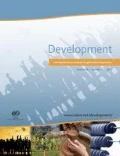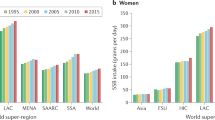Abstract
Sugar consumption has recently become a central issue in the debate over global approaches to address the growing burden of non-communicable diseases (NCDs). Controversies regarding the role of sugar in the aetiology of NCDs such as diabetes and obesity, and their risk factors, are nothing new. Disagreements surrounding recommendations on population upper limits for the daily intake of sugar and other macro-nutrients have persisted in many parts of the world over the last decade. Amalia Waxman outlines the development of a WHO Global Strategy on Diet, Physical Activity and Health (started in 2002) and the 2003 WHO/FAO Expert Report on diet, nutrition and the prevention of chronic diseases, developed in tandem with the Strategy.
Similar content being viewed by others
Notes
The following sugar associations made official comments on the draft Expert Consultation report: Confederation of Food and Drink Industries of the EU, European Vending Association, Food and Drink Federation, Grocery Manufacturers of America, International Soft Drinks Council, International Sugar Organization, Mauritius Ministry of Agriculture, Food Technology and Natural Resources, National Food Processors Association, Queensland Sugar Limited, Republic of the Philippines Sugar Regulatory Administration, South African Cane Growers Association, South African Sugar Association, The Sugar Association, Inc., Sugar Australia Pty Ltd & New Zealand Sugar Company Ltd, Swaziland Sugar Association, Thai Sugar Millers Corporation Limited, Thailand Ministry of Industry Office of the Cane and Sugar Board, and the World Sugar Research Organization.
Recent comments received: Letter to Dr J W Leefrom Mr Eduardo Perera de Carvalho, President of UNICA, Uniao de Agroindutria Canavieira de Sao Paulo, 3 October 2003; Letter to Dr J W Lee from Mr Andrew Briscoe III, President and CEO , The Sugar Association.
References
Barjol J.L. (2003) ‘Letters to Dr Gro Harlem Brundtland, from Director General’, CEFS 24 March, 9 May.
Bell A.C., K. Ge and B. Popkin (2002) ‘The Road to Obesity or the Path for Prevention: Motorized Transportation and Obesity in China’, Obesity Research 10(4).
Bray G.A., S.J. Nielsen and B.M. Popkin forthcoming) High fructose corn sweeteners and the epidemic of obesity’, American Journal of Clinical Nutrition.
Briscoe A.C. III (2003a) ‘Letter to Dr Gro Harlem Brundtland from The Sugar Association’, 2 April.
Briscoe A.C. III (2003b) ‘Letter to Mr Tommy Thompson, Secretary of Department of Health and Human Services’, 20 March.
Briscoe A.C. III (2004) ‘Letter to the Editor, Sugar and Obesity’, 26 January, published 4 February.
Breaux J. and L.E. Craig, Senators (2003) ‘Letter to Secretary, US Department of Health and Human Services and A.C. Briscoe III CEO and President’, 28 March The Sugar Association, (2003) Letter to Dr Gro Harlem Brundtland, 14 April.
Corn Refiners Association, International Dairy Foods Association, National Corn Growers Association, Snack Food Association, The Sugar association, Wheat Food Council, US Council for International Business (2003) ‘Letter to Mr Tommy Thompson, Secretary of Department of Health and Human Services’, 14 April.
Cumming J.H. (1997) ‘Letter re ‘FAO Statement on Sugar, to Jim Mann’, 24 November.
Cumming J.H. (1998) ‘Letter re ‘FAO Statement on Sugar, to Dr De Haen’, 8 January.
De Haen H. (1998) ‘Letter to Jim Mann and J.H. Cumming’, 4 February.
FAO (2004) ‘Committee on Agriculture, Eighteenth Session’, Rome 9–10 February 2004, Draft Report, COAG/2004/REP.
FAO (1998) ‘Carbohydrates in human nutrition, Report of a Joint FAO/WHO consultation, Food and Nutrition’. Paper 66, FAO: Rome.
Guthrie J.F, and Morton (2000) ‘Food sources of added sweeteners in the diets of, Americans’, Journal of the American Dietetic Association 100: 43–48; 51.
Irz X. (2003) ‘Impact of WHO dietary recommendations on world sugar consumption, production and trade’. University of Reading, UK.
Ludw D.S., K.E. Peterson and S.L. Gortmaker (2001) ‘Relation Between Consumption of Sugar Sweetened Drinks and Childhood Obesity: A Prospective, observational analysis’, Lancet 357: 505–508.
Mann J.I., A.S. Truswell, D. Hendricks and E.B. Manning (1970) ‘Effects on Serum Lipids In Normal Men of Reducing Dietary Sucrose or Starch for Five Months’, Lancet 1: 870–872.
Mann, J.I. (forthcoming) Free Sugars in Human Health: Sufficient evidence for action?’, The Lancet.
Mann J.J. (1997) ‘Letter to FAO’, 9 December.
Oxfam (2002) The Great EU Sugar Scam, London; Oxfam International. (Oxfam Briefing Paper, No 27).
Popkin B.M. (1999) ‘Urbanization, Lifestyle Changes and the Nutrition Transition’, World Development 27: 1905–1916.
Popkin B.M. and S. Du (2003) ‘Dynamics of the Nutrition Transition Toward the Animal Foods Sector in China and its Implications: A worried perspective’, Journal of Nutrition 133: 3898.
Popkin B.M. and S.J. Nielsen (2003) ‘The Sweetening of the World's Diet’, Obesity Research 11(11): 1325–1332.
Prentice A.M. and Jebb S.A. (1995) ‘Obesity in Britain: Gluttony or sloth’, BMJ 311: 437–439.
Raben A., Vasilaras T.H., Møller A.C. and Astrup A. (2002) ‘Sucrose Compared with Artificial Sweeteners: Different effects on ad libitum food intake and body weight after 10 wk of supplementation in overweight subjects’, American Journal of Clinical Nutrition 76: 721–729.
Rolls B.J. and E.A. Bell (2000) ‘Dietary Approaches to the Treatment of Obesity’, Medical Clinics of North America 84: 401–418.
Sheiham A. (2001) ‘Dietary Effects on Dental Diseases’, Public Health Nutrition 4(2B): 569–591.
Stubbs J., S. Ferres and G. Horgan (2000) ‘Energy Density of Foods: Effects on Energy intake’, Critical Reviews in Foods Science and Nutrition 40: 481–515.
Vorley B. (2003) ‘Sugar’, Food Inc., Corporate Concentration from Farm to Consumer, London UK Food Group, Chapter 5.
WHO (1990) Diet, Nutrition and the Prevention of Chronic Diseases, World Health Organization, Geneva: Technical Report Series, No. 797.
WHO (1999) Basic Documents, Forty-second Edition, Geneva: World Health Organization.
WHO (2000) ‘Obesity: Preventing and managing the global epidemic, Report of a WHO consultation’. World Health Organization: Geneva (WHO Technical Report Series, No. 894).
WHO (2002) ‘Reducing Risks, Promoting Healthy Life’. World Health Organization: Geneva (World Health Report 2002).
WHO (2003a) ‘Shaping the Future’, The World Health Report 2003.
WHO (2003b) Report of a Joint FAO/WHO Consultation on Diet, Nutrition and the Prevention of Chronic Diseases, World Health Organization: Geneva (WHO Technical Series, No. 916).
Electronic supplementary material
Rights and permissions
About this article
Cite this article
Waxman, A. The WHO Global Strategy on Diet, Physical Activity and Health: The controversy on sugar. Development 47, 75–82 (2004). https://doi.org/10.1057/palgrave.development.1100032
Published:
Issue Date:
DOI: https://doi.org/10.1057/palgrave.development.1100032




